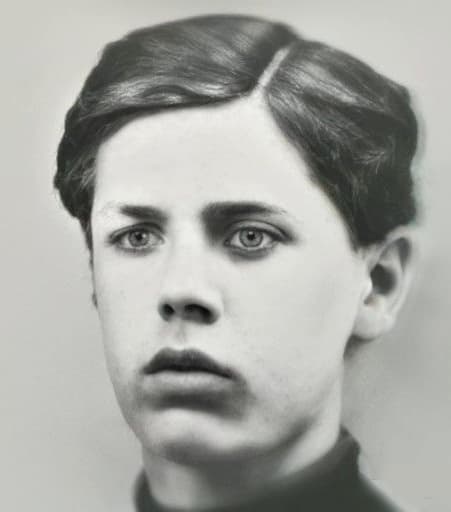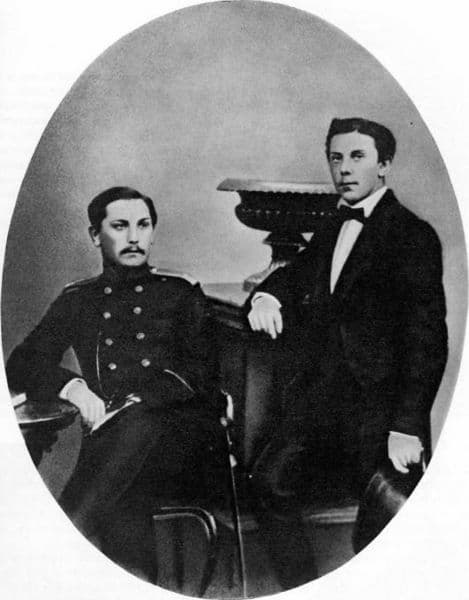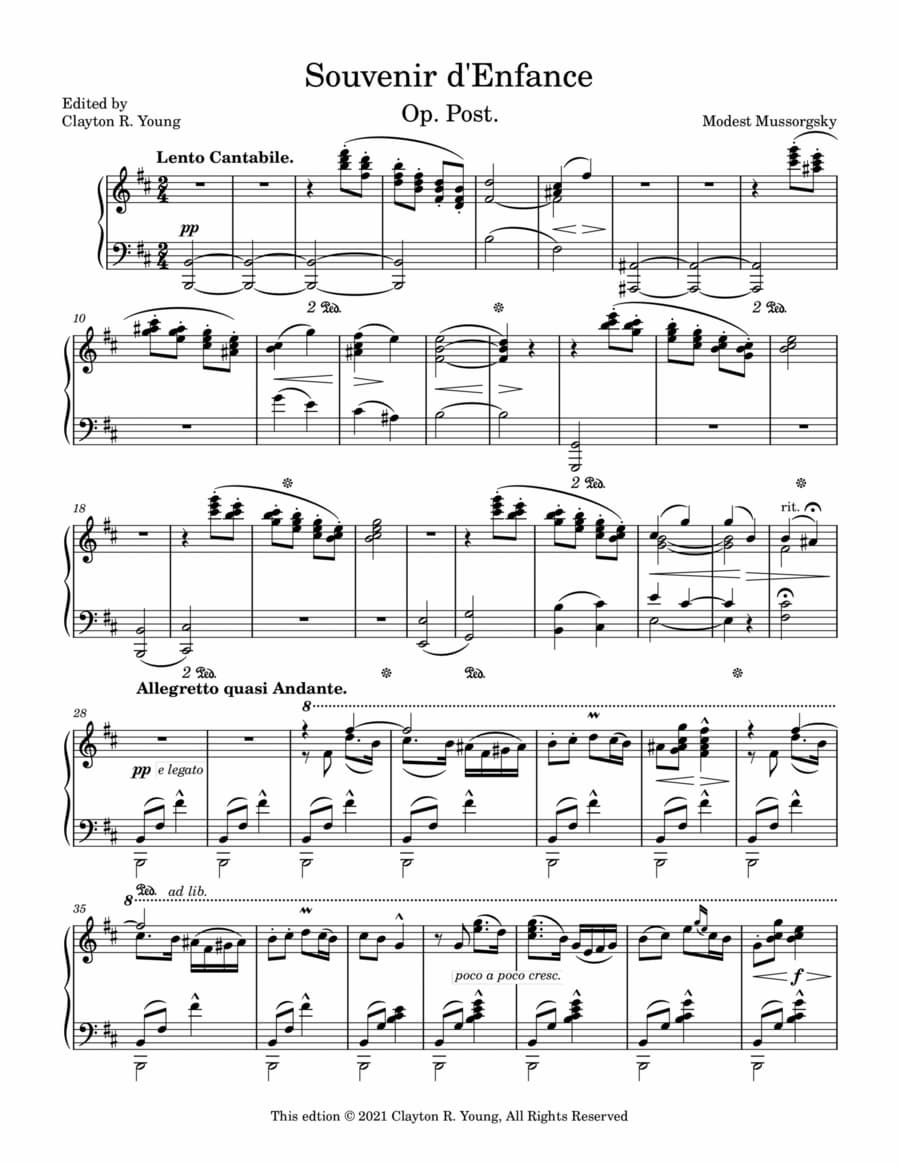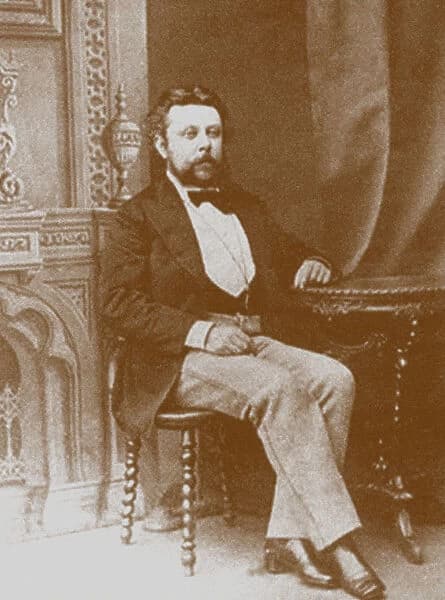The Russian composer Modest Mussorgsky, whose family name survives in an astonishingly diverse number of spellings, was largely self-taught. Yet he discovered a way of writing for the voice that was both lyrical and true to the inflections of speech. Part of the group known as “The Five,” he was an innovator who strove to achieve a unique Russian identity, and his greatest achievements as a composer are found in his operas and solo songs. The current assessment considers him the most striking individual Russian composer of the later 19th century and “an avatar of modernism for the generation of Debussy and Ravel.”
Modest Mussorgsky: Night on Bald Mountain
Heritage

The young Modest Mussorgsky
According to the Gregorian calendar, Modest Petrovich Mussorgsky was born into an ancient gentry family in Karevo, in the Pskov district, on or around 21 March 1839. He was the fourth son of Pytor Alexeyevich Musirskoy and his wife Yulia Ivanovna, nee Chirikova. His birth was greeted with a sense of grave foreboding, as his parent’s first son Alexei died of smallpox at the age of two. A second son, also called Alexei was born a year later and died of the same disease. A third son was born in 1836, and although the parents considered naming him Alexei as well, they attempted to deceive death by calling him Evgeny.
According to the Russian Orthodox faith, children were baptized after one of the saints or martyrs associated with their birth. When the fourth son was born, the parents contemplated the standard names of Alexander, Ilya, and Nikolai. However, they settle on “Modest.” Derived from a Latin root, the name means unassuming, humble, and he who lies low. A biographer writes, “the mother did not wish to select one of the names of the martyrs in order to protect her child from fate that had carried off two of her children in their infancy.”
Modest Mussorgsky: “The leaves rustled sadly” (Aage Haugland, bass; Poul Rosenbaum, piano)
First Musical Exposure

Modest Mussorgsky and his brother Evgeny
The family’s principal estate, where he spent the first ten years of his life, lay amid forests and fields about 400 km south-south-east of St Petersburg, overlooking Lake Zhizhitsa. Mussorgsky, in an autobiographical sketch authored later in life, explained that he loved to listen to Russian folktales told by his nurse “and tried to capture their spirit of improvisation at the piano before he had learned even the most basic rules of playing.
As Modest reports, “my mother gave me my first piano lessons, and my progress was such that at the age of seven, I was playing small pieces by Liszt, and at nine played a grand concerto by John Field before a large audience at my parents’ home. My father, who worshipped music, decided to develop my abilities and entrusted my further musical education to Anton Herke in St. Petersburg.” Herke had been a student of Field, Kalkbrenner, Moscheles, and Ries, and Modest spent the next two years with him at an élite secondary school for the sons of the gentry.
Modest Mussorgsky: Pictures at an Exhibition, (excerpts)
Wine, Women and Song

Mussorgsky’s earliest composition
All accounts of Mussorgsky’s early years agree on his astonishing skill at the keyboard, “a skill that remained impeccably in place throughout the composer’s physical decline.” After a year at a preparatory boarding school for prospective cadets, Mussorgsky entered the Cadet School of the Guards in 1852 to train for a career as a military officer. Little is known about Modest’s life between 1852 and 1856, but his brother reports that he became interested in history and, subsequently, German philosophy. He continued to progress rapidly in his lessons with Herke, and Modest produced and published his first musical composition around the age of 13.
In his final year of study, Modest had still not received lessons in harmony and composition, but he planned an opera after a Victor Hugo text, which did not materialise. Modest was highly active in various musical circles, and we find the first reports of excessive womanising and drunkenness. While seemingly befitting behaviour for a dashing young Russian officer at the time, a contemporary writes, “he even learned how to drink himself into oblivion.”
Modest Mussorgsky: “King Saul” (Aage Haugland, bass; Poul Rosenbaum, piano)
Borodin and Dargomïzhsky

Modest Mussorgsky, 1874
After Modest achieved the rank of ensign, he eventually retired from active service, and he first met Borodin in 1856, who described him as “an elegant piano-playing dilettante.” During the winter months of 1856-7, Mussorgsky was introduced to Dargomïzhsky, already an established composer, and soon he began to appear at musical evenings in Dargomïzhsky’s home. In turn, he was introduced to Cui, and soon made the acquaintances of Balakirev and Stasov. In the event, Mussorgsky decided to devote his life entirely to music.
He began lessons in composition with Balakirev, which “consisted of their playing and analyzing all Beethoven symphonies and compositions by Schubert, Schumann, Berlioz, Liszt and Glinka in piano duet arrangements.” Mussorgsky soon was writing early songs and apprentice works, and a handful of piano transcriptions. He also started on two piano sonatas and began to compose some incidental music. However, during the summer of 1858 he suffered a personal crisis, and only returned to St Peterburg after spending several weeks in the country. Bouts of severe depression and alcoholism would sadly accompany the composer throughout the rest of his life.
For more of the best in classical music, sign up for our E-Newsletter
